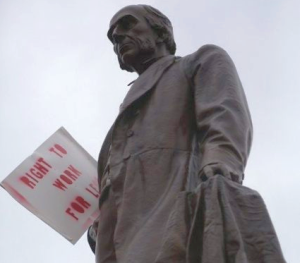Oh, this is rich
 Last week a judge in Indiana ruled that the state’s so-called “right to work” law is unconstitutional. According to federal law, unions must cover everyone at a workplace but Indiana law prohibits delivery of services “without just compensation”. Since Indiana’s right to work law allows workers to benefit from union collective bargaining but does NOT require them to contribute to unions that are working on their behalf, the unions sued.
Last week a judge in Indiana ruled that the state’s so-called “right to work” law is unconstitutional. According to federal law, unions must cover everyone at a workplace but Indiana law prohibits delivery of services “without just compensation”. Since Indiana’s right to work law allows workers to benefit from union collective bargaining but does NOT require them to contribute to unions that are working on their behalf, the unions sued.
The state Attorney General is filing an appeal with the state supreme court.
Ironically, most observers believe the ruling by Lake Superior Court Judge John Sedia will be overturned. Why? Here’s Joel Schumm, a law professor at the Indiana University Robert H. McKinney School of Law in Indianapolis:
“Unions are not generally thought of as a ‘person,’ nor are they organizations that existed when the Indiana Constitution was ratified in 1851,” he said.He thinks it’s unlikely the Indiana Supreme Court will redefine individuals as unions. He said the court gives significant deference to the legislature to enact state laws.
It is a bitterly ironic situation. The corporations that stand to benefit most from the reduction in workers’ wages that will inevitably occur with time as unions (along with their Democratic allies) are kneecapped by this law ARE considered to be “people”. Mitt Romney’s now-famous “corporations are people, my friend” statement wasn’t just one wealthy corporatist’s opinion. It’s actually a fact, supported by multiple U.S. Supreme Court decisions.
But the unions that represent working men and women that do the work that creates the wealth corporations enjoy? Not so much. They may be unions of people but, according to the law, they are not people. Only corporations enjoy that benefit, the result of some seriously convoluted pretzel logic.
Labor activists across the nation, particularly in Michigan, the country’s newest right to work state and the birthplace of the labor movement, are watching closely to see how the Indiana supreme court will decide this case. Considering the massive amount of money that people corporations can spend to influence opinion (and elections), I am not particularly optimistic.
[Photo credit: Anne C. Savage, special to Eclectablog]



